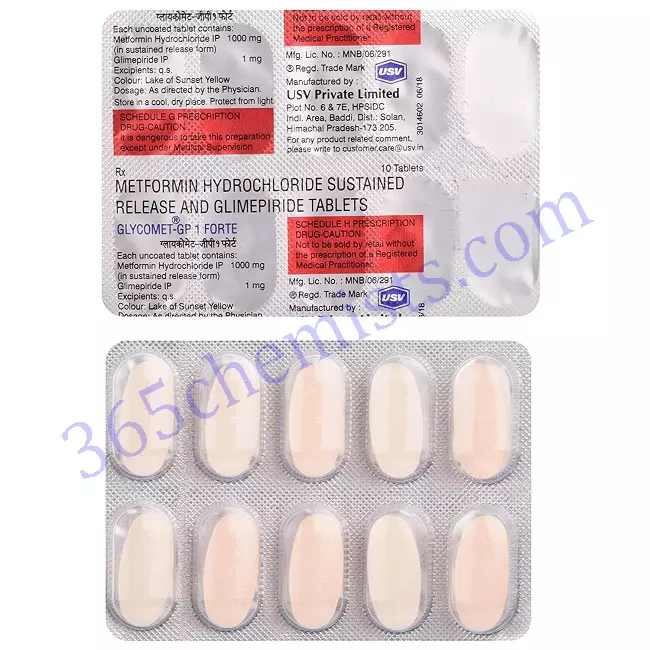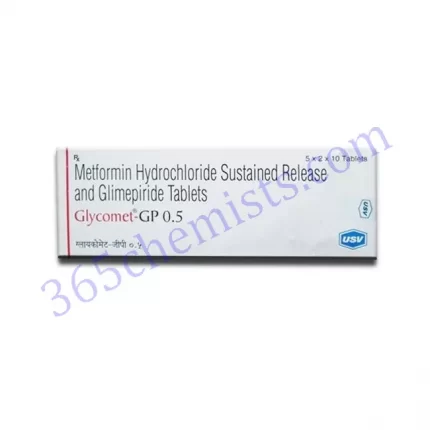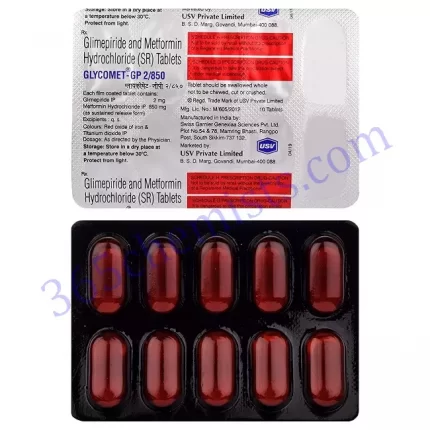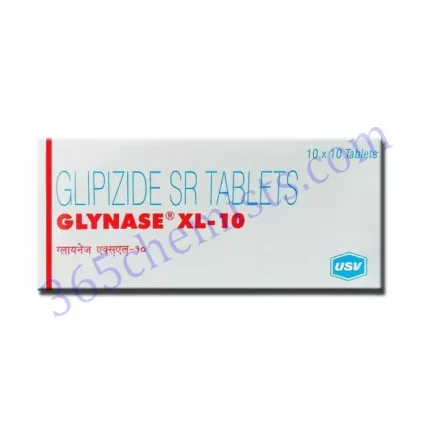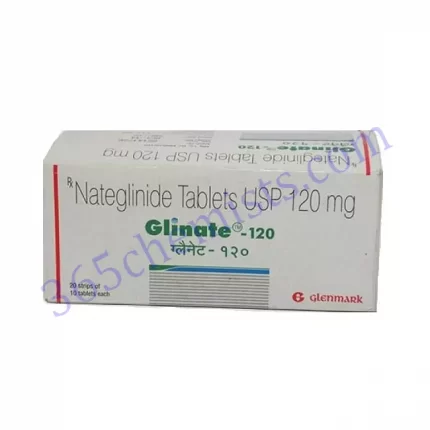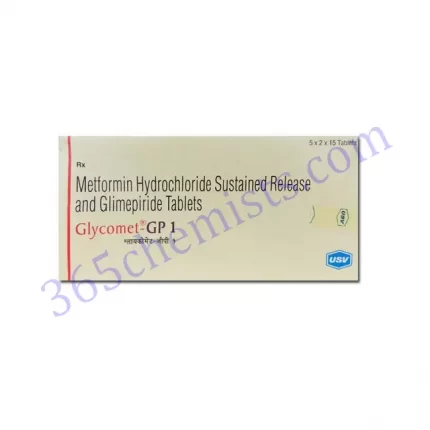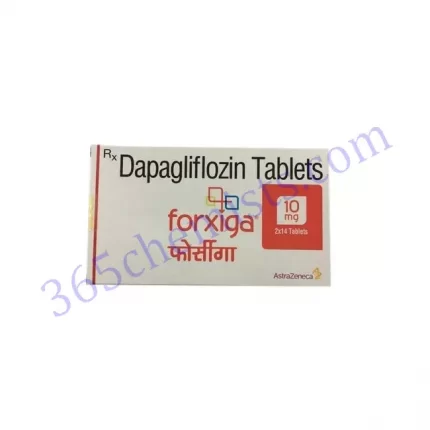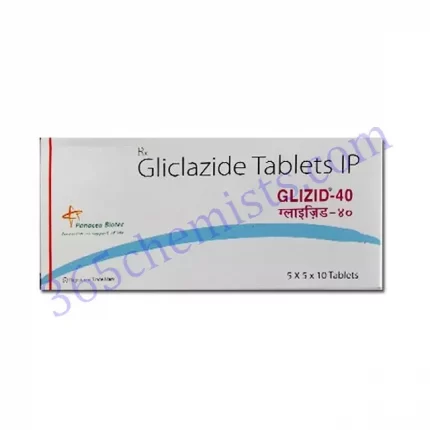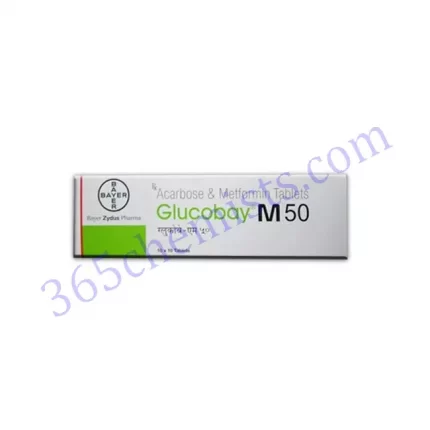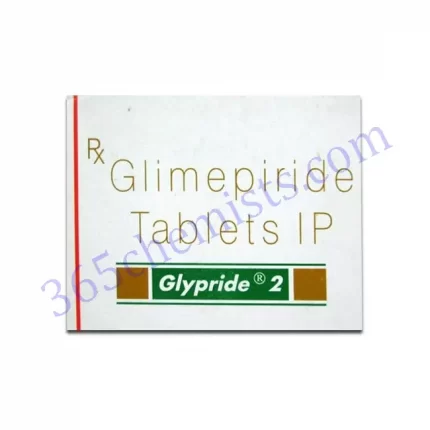Glycomet-GP 1/1000mg Forte Tablet: A Comprehensive Overview of Glimepiride/Metformin Combination Medication
Metformin and glimepiride are the two active components that are combined in the pharmaceutical preparation known as Glycomet-GP 1/1000mg Forte Tablet. This tablet is recommended for the management of diabetes type 2 in order to assist in maintaining effective control over the patient’s blood sugar levels. The purpose of this article is to provide a comprehensive overview of Glycomet-GP 1/1000mg Forte, including the medication’s make-up, mechanism of action, therapeutic applications, dosage, potential adverse effects, and precautions.
Composition
The Glycomet-GP 1/1000mg Forte Tablet is made up of its two basic components, which are as follows:
- Glimepiride is an anti-diabetic medicine that is classified as a sulfonylurea. Glimepiride is also known as glimepiride. It accomplishes this by activating the beta cells of the pancreas to produce more insulin, which in turn results in a decrease in the amount of glucose in the blood. Glimepiride also improves the peripheral utilisation of glucose, which contributes to improved control of blood sugar levels.
- Metformin is a biguanide chemical that is commonly utilised in the management and treatment of type 2 diabetes. It does this mostly by suppressing gluconeogenesis and glycogenolysis, which results in decreased glucose synthesis in the liver. Metformin increases insulin sensitivity in peripheral tissues, which in turn promotes glucose uptake and utilisation in the body.
Mechanism of Action
In order to provide comprehensive glycemic control, the Glycomet-GP 1/1000mg Forte Tablet combines the mechanisms of action of the diabetes medications metformin and glimepiride. Glimepiride works by encouraging the pancreas to produce more insulin, primarily in reaction to the glucose levels that are brought on by meals. This effect contributes to a reduction in postprandial hyperglycemia and an improvement in glycemic control overall.
Metformin, on the other hand, primarily targets the levels of glucose in the blood when the patient is fasting. Through its inhibition of gluconeogenesis and glycogenolysis, it brings to a reduction in the amount of glucose produced by the liver. Metformin improves insulin sensitivity in peripheral tissues, which in turn leads to an increase in glucose uptake by muscle cells and a reduction in insulin resistance.
When used together, the actions of glimepiride and metformin in Glycomet-GP 1/1000mg Forte Tablet are able to provide comprehensive glycemic control by helping to regulate both fasting blood glucose levels and blood glucose levels after meals.
Therapeutic Uses
The treatment of diabetes mellitus type 2 is the primary purpose for which the Glycomet-GP 1/1000mg Forte Tablet should be utilised. When monotherapy with glimepiride or metformin alone is not sufficient to regulate blood glucose levels in an appropriate manner, this medication may be recommended instead. An improved method of controlling diabetes and establishing optimal glycemic control can be attained by the use of both of these drugs in conjunction with one another.
Related Product
Glycomet 250 Tablet
Glycomet 500mg Tablet
Glycomet 850mg Tablet
Glycomet 850 SR Tablet
Glycomet 1gm Tablet
Glycomet 1gm SR Tablet
Glycomet GP 0.5 Tablet
Glycomet GP 1/500mg Tablet
Glycomet GP 2/500 Tablet
Glycomet GP 2/850 Tablet
Glycomet GP 2 Forte Tablet
Glycomet GP 3 Forte Tablet
Glycomet GP 4 Forte Tablet
Glycomet GP 0.5/1000mg Forte Tablet
Glycomet GP 1/1000mg Forte Tablet
Glycomet GP 3/850mg Tablet
Glycomet Trio 1 Tablet
Glycomet Trio 1/0.3 Tablet
Glycomet Trio 2 Tablet
Glycomet Trio 2/0.3mg Tablet
Glycomet Trio Forte 1 Tablet
Glycomet Trio Forte 2 Tablet
Dosage and Administration
It is recommended that a healthcare practitioner establish the appropriate dosage of the Glycomet-GP 1/1000mg Forte Tablet for each individual patient based on unique patient factors such as age, renal function, and overall health state. It is essential to take the medication exactly as prescribed, both in terms of dosage and delivery instructions. It is recommended that the tablet be taken orally once day, most ideally with food, in order to lessen the likelihood of experiencing adverse effects on the gastrointestinal tract that are linked with metformin.
It is crucial to monitor blood glucose levels on a consistent basis in order to determine how effectively the medicine is working and to make any required modifications to the dosage.
Potential Side Effects
The Glycomet-GP 1/1000mg Forte Tablet, like any other drug, has the potential to produce adverse effects in certain people. The following are some of the most frequently reported adverse effects connected with this medication:
- Hypoglycemia: Because glimepiride is a sulfonylurea, it has the potential to cause hypoglycemia, also known as low blood sugar levels. There is a possibility that you will have symptoms such as sweating, dizziness, trembling, confusion, and blurred vision. Consuming a source of glucose that acts quickly in the body is an effective way to correct hypoglycemia as quickly as possible.
- Effects on the Gastrointestinal Tract It’s possible that some people will have issues with their gastrointestinal tract, like feeling sick, throwing up, having diarrhoea, or having abdominal pain. These adverse effects are, in most cases, modest and quite temporary.
- A potentially life-threatening condition known as lactic acidosis may be brought on by taking metformin, despite the fact that this side effect is rather infrequent. Muscle pain, fast breathing, lightheadedness, and discomfort in the abdomen region are all possible symptoms. Lactic acidosis requires rapid medical intervention.
Precautions
It is imperative that the following precautions be taken into consideration before beginning therapy with Glycomet-GP 1/1000mg Forte Tablet:
- Because of the risk of allergic reactions, individuals who are aware that they are hypersensitive to sulfonylureas, biguanides, or any of the other components of the tablet should not take it.
- Metformin is mostly eliminated through the kidneys, making renal impairment a potential side effect. Adjusting the dosage or taking extra precautions is important when treating patients with renal impairment or severe renal dysfunction because of this.
- Hepatic Impairment Patients who are using Glycomet-GP 1/1000mg Forte may need to be carefully monitored if they have a condition that affects the liver. In the case of these individuals, a change to the dosage might be required.
Conclusion
Glycomet-GP 1/1000mg Forte Tablet offers a comprehensive strategy for managing type 2 diabetes mellitus by combining the therapeutic effects of glimepiride with metformin. This combination creates a synergistic effect. This combination drug improves glycemic control by acting on a number of different mechanisms that contribute to the regulation of glucose and sensitivity to insulin. For the treatment to be effective, it is essential to take the given dosage, report any unwanted effects in a timely manner, and take any and all precautions that may be necessary. It is important to speak with a medical practitioner in order to evaluate whether or not Glycomet-GP 1/1000mg Forte is appropriate for a specific patient and to receive answers to any questions or concerns regarding the medication’s administration.

